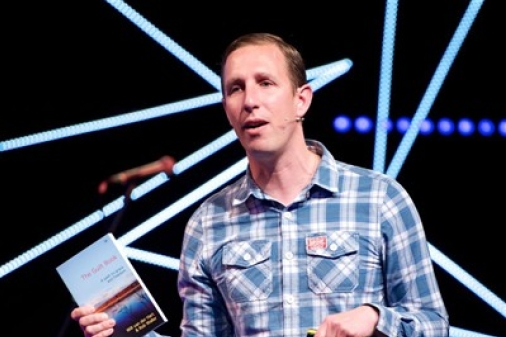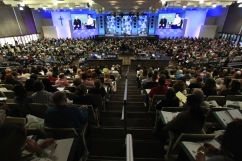
Can we have a conversation about mental health and the Church? Rev Will Van Der Hart would like to think so. As pastoral chaplain at Holy Trinity Brompton, he is passionate about getting church leaders to look after their own mental health as well as equipping them to help those in their congregations. He is a director of Premier Mind and Soul, a charity that seeks to bridge the gap that often exists between Christianity and mental health issues.
Van der Hart first became interested in the interplay between faith and mental health issues when he was doing chaplaincy training in a dementia unit in Oxford. He says: "I couldn't accept that God had abandoned these wonderful older people just because their minds were now failing them. I realised how academic and dependent on an ordered mind my faith had become. I saw God do some amazing things in that ward, completely aside from my ministry or their capacity, which gave me a hope that has never left me."
At that time his understanding was more theoretical but that all changed in 2005 when he found himself caught up in the 7/7 terrorist bombings. "I put on my dog collar like it was a super-hero suit and went under the cordon. I had no idea of the impact that event would have on my emotional health."
He was given the Metropolitan Police Assistant-Commissioner's Commendation for the work he did supporting the emergency services but three months later he suffered from acute anxiety, which included daily panic attacks and depressive feelings.
He says: "It was hard to describe the level of anxiety that I felt over very minor things. I literally thought I was losing my mind but at the same time I knew that God was with me and still loved me.
"My experience was made much harder by the response I received from many of my clergy friends, who just didn't know what to say. They either tried to deny there was anything wrong with me at all, or they suggested it was a spiritual problem and that the devil was attacking me. That obviously made me more anxious!"
Van der Hart found that a combination of cogntive behavioural therapy, prayer and GP support (including a low dose of anti-depressant medication) made a profound impact upon his symptoms. However, he stresses that there are levels of recovery and dealing with immediate symptoms is just part of the healing process.
Soon after he was significantly recovered he began to wonder: "If the vicar feels this stigmatised and ashamed what hope is there for people in the congregation?" He explains: "That was the point at which I decided to start speaking out about mental health. A good friend of mine from Cambridge, Dr Rob Waller, had become a consultant psychiatrist and he was already blogging online. I joined him and mindandsoul.info was born.
"From the start Rob was trying to help the NHS to gain a better view of faith in the sphere of mental health. As a very well regarded clinician he has been able to garner the respect of many others in the psychiatric field while showing them that the Christian faith is not a psychological delusion or neurotic crutch."
He believes that mindandsoul.info has brought together clinicians and offered them encouragement in a field that for many years has been quite disparaging about faith. The full team includes Dr Kate Middleton, a medical doctor and psychologist.
His passion has, from the start, been on the faith end of the scale; helping the Church to recognise that clinical treatments and medications are acceptable and beneficial for Christians: "Specifically we have sought to address the faith stigma surrounding mental health and open up a much more honest conversation.
"I guess if I was going to describe a sense of vision I carry for my work, I still delight in helping individual people know that they are deeply loved by God even in the struggle for their emotional or mental health. Over the last nine years I have had three letters from people saying that through some time we shared, they decided not to kill themselves. If that is all I ever achieve it will have been worth it."
Robin Williams' suicide really brought home the need to talk about mental health, particularly among men. In the UK the total number of female suicides has nearly halved over 30 years to just 1,391 while the annual suicides among UK men has increased to 4,590. Clearly there is so much that we need to do to enable men to talk about their emotional state and the Church should be a safe place to do just that.
This year's World Mental Health Day is focusing on schizophrenia – something van der Hart has seen Christians suffer from first hand.
"So often Christians suffering from this difficult disorder feel grossly misunderstood and stigmatised. Hollywood has done a terrible disservice to schizophrenia suffers, misinforming the public about the symptoms, and the Church has often equated this disease with demonic possession. Just to be clear, you are just as likely or unlikely to be under demonic influence as a diabetic than as a schizophrenic. It is time the Church really loved and included people with this disorder."
Mind and Soul always recommend that people who think that they may be suffering from a mental health problem seek confidential advice from their GP. Indeed a third of all GP consultations relate to mental health so they are very experienced and helpful.
He has some general advice for those who may be struggling with mental health issues: "Just as with all medical problems, we recommend that Christians use discernment about who they share their issues with, but is always helpful to break the silence and talk things through with a couple of trusted friends.
"Sites like ours can be very helpful in gaining a good clinical understanding and orthodox Christian outlook, and we recommend that you try to understand as much as possible about what you are dealing with. We believe that the presence of Jesus is the greatest gift in the struggle with emotional and mental health issues, so any time you can spend in worship or prayer is time well spent."





















